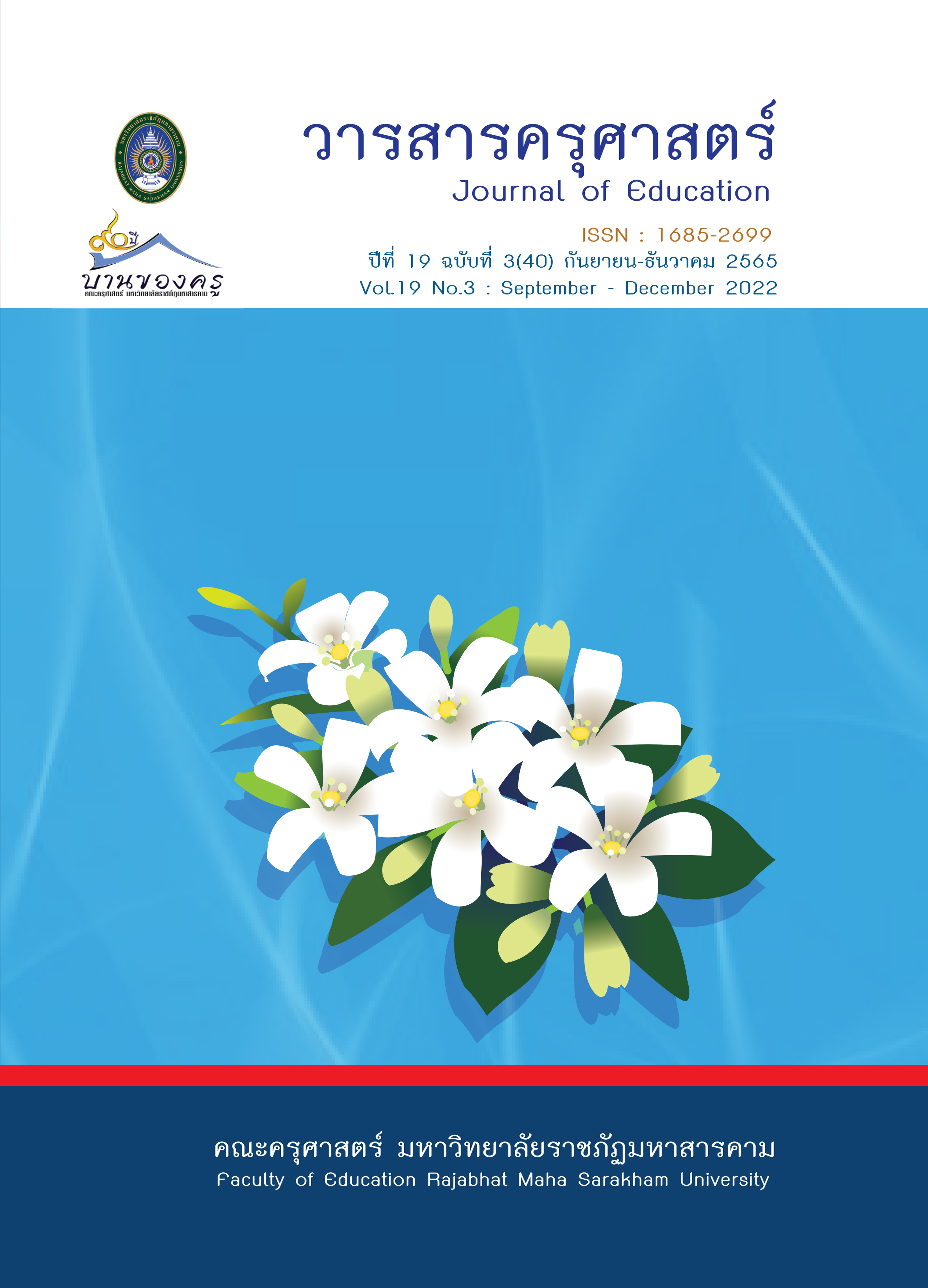การพัฒนาการเรียนรู้แบบโครงงานเป็นฐานบนเว็บเพื่อส่งเสริมสมรรถนะดิจิทัล รายวิชาการสร้างโฮมเพจ ระดับชั้นมัธยมศึกษาปีที่ 2
Main Article Content
บทคัดย่อ
การวิจัยครั้งนี้มีวัตถุประสงค์เพื่อพัฒนาการเรียนรู้แบบโครงงานเป็นฐานบนเว็บเพื่อส่งเสริมสมรรถนะดิจิทัล รายวิชาการสร้างโฮมเพจ ระดับชั้นมัธยมศึกษาปีที่ 2 ประเมินสมรรถนะดิจิทัลและสอบถามความคิดเห็นของกลุ่มเป้าหมายหลังจากการเรียนรู้ในรูปแบบดังกล่าว ซึ่งกลุ่มเป้าหมายได้แก่ ผู้เรียนในระดับชั้นมัธยมศึกษาปีที่ 2 โรงเรียนสาธิตมหาวิทยาลัยขอนแก่น จำนวน 37 คน จากการสุ่มตัวอย่างแบบง่าย โดยใช้รูปแบบ One Shot Case Study ในการวิจัยและใช้หลักการพัฒนาแบบน้ำตกพัฒนาสื่อการเรียนรู้บนเว็บ ซึ่งผลการวิจัยพบว่า 1) การจัดการเรียนรู้แบบโครงงานเป็นฐานพร้อมกับการส่งเสริมสมรรถนะดิจิทัลในชั้นเรียน โดยใช้แผนการจัดการเรียนรู้และสื่อการเรียนรู้บนเว็บที่ผ่านการประเมินความเหมาะสมจากผู้เชี่ยวชาญในระดับความเหมาะสมมากที่สุด นอกจากนี้ผลคะแนนโครงงานกลุ่มของผู้เรียนมีค่าเฉลี่ยรวมเท่ากับ 23.69 มีค่าส่วนเบี่ยงเบนมาตรฐาน (S.D.) เท่ากับ 5.467 ค่าเฉลี่ยรวมคิดเป็นร้อยละ 78.97 จากคะแนนเต็ม 30 คะแนน 2) ผลการประเมินสมรรถนะดิจิทัลของผู้เรียน พบว่าเมื่อผู้เรียนทำใบงานและโครงงานในแต่ละแผนจัดการเรียนรู้หลังจากที่เรียนรู้ด้วยการจัดการเรียนรู้แบบโครงงานเป็นฐานบนเว็บมีคะแนนการประเมินรวมเฉลี่ยจากผู้เรียนทั้งหมดมีค่าเฉลี่ยรวมเท่ากับ 81.22 มีค่าส่วนเบี่ยงเบนมาตรฐาน (S.D.) เท่ากับ 5.812 ค่าเฉลี่ยรวมคิดเป็นร้อยละ 90.25 ของคะแนนเต็ม 90 คะแนน และ 3) ผู้เรียนเห็นด้วยกับการเรียนรู้ที่ผู้วิจัยพัฒนาในระดับมากที่สุด ( = 4.23) (S.D. = 0.729)
Article Details

อนุญาตภายใต้เงื่อนไข Creative Commons Attribution-NonCommercial-NoDerivatives 4.0 International License.
ข้อกำหนดเบื้องต้นที่ผู้นิพนธ์(ผู้ส่งบทความ) ควรทราบ
1. ผู้นิพนธ์ที่ประสงค์จะลงตีพิมพ์บทความกับวารสาร ตั้งแต่เดือนมกราคม 2563 เป็นต้นไป ให้ใช้รูปแบบใหม่ (Template 2563) โดยสามารถดูตัวอย่างได้ที่เมนู GUIDELINES
2. จะตีพิมพ์และเผยแพร่ได้ ต้องผ่านการประเมินจากผู้ทรงคุณวุฒิ (Peer Review)
3. การประเมินบทความโดยผู้ทรงคุณวุฒิ (Peer Review) เป็นแบบ Double Blind
4. การอ้างอิงบทความใช้หลักเกณฑ์ APA (American Psychological Association) คลิก
5. บทความถูกปฏิเสธการตีพิมพ์ ไม่ผ่านการประเมิน ผู้นิพนธ์ขอยกเลิกเองหรือชำระเงินก่อนได้รับการอนุมัติ ทางวารสารไม่มีนโยบายการคืนเงิน
เอกสารอ้างอิง
กระทรวงศึกษาธิการ. (2560). หลักสูตรแกนกลางการศึกษาขั้นพื้นฐาน พุทธศักราช 2551 (ฉบับปรับปรุง พ.ศ.2560). กระทวงศึกษาธิการ.
ดุษฎี โยเหลา และ คณะ. (2557). การศึกษาการจัดการเรียนรู้แบบ PBL ที่ได้จากโครงการสร้างชุดความรู้เพื่อสร้างเสริมทักษะแห่งศตวรรษที่ 21 ของเด็กและเยาวชน : จากประสบการณ์ ความสำเร็จของโรงเรียนไทย. ทิพย์วิสุทธิ์.
ชัชวาลย์ เรืองประพันธ์. (2539). สถิติพื้นฐาน (พิมพ์ครั้งที่ 2). โรงพิมพ์คลังนานาวิทยา.
พิรดา ผาคำ. (2564). แนวทางการส่งเสริมสมรรถนะดิจิทัลของนักศึกษาระดับปริญญาตรี คณะศึกษาศาสตร์ มหาวิทยาลัยเชียงใหม่ ในยุคการศึกษา 4.0. วารสารบัณฑิตวิจัย 12(2), 119-131.
ลลิตา วงค์มลี. (2564). การพัฒนาบทเรียนบนเครือข่ายตามการเรียนรู้แบบโครงงานเป็นฐาน เรื่อง บอร์ดไมโครคอนโทรเลอร์เพื่อส่งเสริมทักษะการคิดเชิงคำนวณ สำหรับนักเรียนชั้นมัธยมศึกษาปีที่ 3. วารสารเทคโนโลยีและสื่อสารการศึกษา คณะศึกษาศาสตร์ มหาวิทยาลัยมหาสารคาม 5(13), 61-76.
เลอสันต์ ฤทธิขันธ์. (2564). การพัฒนาบทเรียนคอมพิวเตอร์ช่วยสอนแบบมีปฏิสัมพันธ์ เรื่องเทคโนโลยีสารสนเทศและการสื่อสาร สำหรับนักเรียนชั้นประถมศึกษาปีที่ 2 โรงเรียนสาธิตมหาวิทยาลัยราชภัฏบุรีรัมย์. วารสารเทคโนโลยีและสื่อสารการศึกษา คณะศึกษาศาสตร์ มหาวิทยาลัยมหาสารคาม 4(10), 137-146.
วรลักษณ์ คำหว่าง. (2560). การศึกษาสภาพและแนวทางการพัฒนาทักษะครูในศตวรรษที่ 21 สังกัดสำนักงานเขตพื้นที่การศึกษามัธยมศึกษา ในจังหวัดพิษณุโลก. วารสารวิชาการ มหาวิทยาลัยราชภัฏลำปาง 6(1),
-138.
เอกรินทร์ ศรีลาพัฒน์. (2560). การพัฒนารูปแบบการเรียนการสอนโดยใช้ห้องเรียนกลับด้านร่วมกับการเรียนรู้แบบยูบิคิวตัส (รายงานการวิจัย). สาขาวิทยาการคอมพิวเตอร์ มหาวิทยาลัยราชภัฏมหาสารคาม.
Calvani, A., Cartelli, A., & Ranieri, M. (2009). Models and instruments for assessing digital competence at school. Journal of E-Learning and Knowledge Society, 4(3) 183-193.
Gallardo-Echenique, E.E., de Oliveira, J.M., Marqu, L., & Esteve-Mon, F. (2015). Digital competence in the knowledge society. Journal of Online Learning and Teaching, 11(1), 1-16.


